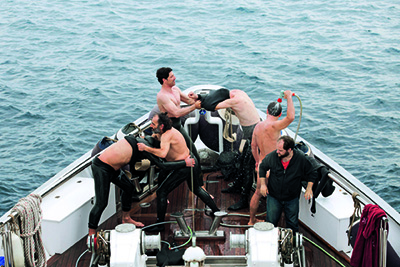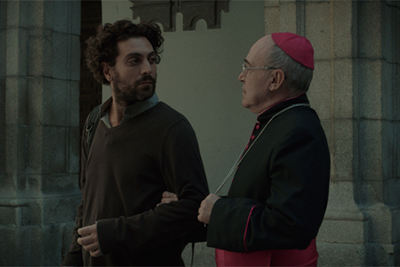Kirsten Johnson’s Cameraperson; Osgood Perkins’ The Blackcoat’s Daughter; Zhao Liang’s Behemoth; Athina Rachel Tsangari’s Chevalier; Wisconsin’s Own experimental shorts + Guy Maddin’s Bring Me the Head of Tim Horton; Philippe Garrel’s In the Shadow of Women; and Federico Veiroj’s The Apostate
My personal itinerary Fri through Sun:
Cameraperson (Fri — Union South Marquee)
Comprised of unused, recontextualized footage from over two dozen documentaries over an equivalent number of years, Kirsten Johnson posits her latest film as a memoir. From 30-second takes in the majesty of rural parts of the United States to longer reels of startling intimacy at a Nigerian hospital where a nurse midwife assists in the birthing process, Cameraperson feels at once like candid moments in-between takes and a formal lesson in filmmaking. When interviewing subjects, like the survivors of ethnic cleansing in Bosnia, Johnson is occasionally heard coaching her subjects to reveal their darkest truths. And at times, Johnson’s own lens seems to inadvertently, metaphorically flip; she becomes the emotionally affected subject spilling her truths behind or in front of her own camera, the delicate pitch of her voice telling the true value and virtue in her work: “You are making me cry even though I don’t understand the language.”
The sharply oscillating tones between locations in the film may superficially trivialize the impact of its greatest human injustices, but the editing’s undulating, humanistic rhythm provides moments of enlightenment and laughter, joy in light of tragedies perpetuated throughout the history and current events where Johnson herself has intervened in a small but essential way. As she continues jumping back-and-forth between Africa, Eastern Europe, and numerous parts of the United States, including her childhood home in Washington State, the film grows increasingly personal, commenting on movie memory through re-presentation of scenes as familiar as the one of Michael Moore interviewing a sharpshooter in Fahrenheit 9/11 (as one example) and personal memory of Johnson’s mother, Catherine Joy, who suffered the effects of Alzheimer’s late in life. Cameraperson would make a wonderful companion to Chantal Akerman’s No Home Movie (which screened at the Cinematheque less than a few months ago), which also celebrates the life of the director’s late mother, provoking and sustaining discussion about the vitality of the documentary. If a picture is worth a thousand words, are these moving images worthy of 24,000(fps)?

The Blackcoat’s Daughter (Fri — Cinematheque)
Perkins stacks horror tropes upon horror tropes (and the piercing tinnitus drone of composer Elvis Perkins) with a deceptive Van Sant/Elephant-esque structure. Under the weight of its own malice, the film plods until those supposed blonde dead ringers (Kiernan Shipka and Emma Roberts) collide into a revelation that suggests a nine-year chronicle about teenage demonic possession. If you’re craving to witness a few rolling heads, the Head of Tim Horton in this year’s festival is really the only one you need.
Behemoth (Sat — Cinematheque)
The insatiable titan of industry is the target of director Zhao Liang’s criticisms in his heavy, environmentally and cinematically devastating experience. The tranquility of the ever-shrinking natural world is juxtaposed, quite literally, against the thunderous explosive charges of a massive site for coal excavation in Inner Mongolia. In the poetic, diaristic voiceover (from Dante’s Divine Comedy), one of the weary male workers describes the huge hauling trucks as the “monster’s playthings,” and the high aerial shot recalls the animated demonstration of bulldozers rapidly tearing into a leaf in Ghibli’s Pom Poko of all things. Even if there’s relief from the daily grind at his family’s small hut, the expanding, erosive site looms within full view, about a quarter of a mile away, above the earth and through it into the desolate chambers to a trolley cart and then a steel furnace. The toil of the work manifests itself psychologically as well as bodily (hand blisters, facial scars), and really, in the maintenance of every facet of their existence. The crater left in the earth is a crater left in the soul of Man, victims of our own devices.
A glimmer of hope surfaces in splintered, verdant dreamlike shots where the man lays naked on his side, asleep, hoping to awaken from this new reality into a ghostly serene paradise. If Liang’s film seems ethnographic in a sense like the recent wave of films, it is separated by these moments that break from the gritty, unflinching verité to align more with the precision of Joshua Oppenheimer’s Look of Silence (WFF 2015), for instance. An ambient-drone soundtrack also adds to the feeling of suspended reality, as a nearly interconnected line of vehicles stretches beyond the horizon, power plants’ steam fills the air to obscure the clouds, and oil rigs belch flames; it’s not unlike the industrial landscape in the proto-sci fi of Antonioni’s Red Desert. In Behemoth‘s entanglement of the documentary and art film formats, it reaches a level of ecstatic beauty but also falls victim to a language that doesn’t always reinforce the potency of its images, and the words feel like redundant afterthoughts as in the extreme close-ups of workers’ soot-covered faces and a remark about their “distressed visages.” However, the final minutes so brilliantly convey a sense of loss through a mirror of spoken word and image. You won’t walk away unaffected.

Chevalier (Sat — Cinematheque)
This absurdist tragicomedy from Athina Rachel Tsangari plays almost like a social experiment as observed and reconstructed by beings from another planet. On a return trip to Athens, six men aboard a yacht in the Aegean Sea slowly begin to critique one another to pass the time. It begins with a insignificant bet about holding one’s breath and quickly escalates to fitness and physique. And then, well, everything. To determine who’s the “best in general,” the men enter into an impossible contract, a personal downward hell-spiral where paranoid competition swallows sound judgment. As this so-called game hinges upon the completely subjective view, it’s automatically meaningless, but that doesn’t stop any of them from going to extreme lengths to impress (and claim they’re “winning!”) so they can flaunt the coveted chevalier signet ring. And this instigates a sincerely interesting question about human nature, as none of the men are really performing or going about their business naturally. From cleaning routines on deck to personal recipes, it’s all affect against an invisible clock. As the men compare notes, mostly in the negative column, it’s certainly in that vein of the Seinfeld episode, “The Package,” where Elaine attempts to get medical treatment but is refused by a conspiracy of doctors who’ve written a series of negative impressions on her chart.
The tragic undercurrent of Chevalier also possesses an alarmingly relevant dimension in that the contest is a revoltingly inadvertent commentary on the political process, particularly in the current election cycle if the Republican debates have anything to say about it. Inevitably, the game descends into disputes on their heterosexual prowess without the ability to immediately prove it and a literal member-measuring contest. No matter how far men and women have advanced technologically or socially beyond the roots of our ancestry, primal alpha behavior and that desire for power (evident as leading candidate Christos tries to psych himself up in the mirror) is inborn. And, as the men stoop to lower lower depths to emerge victorious, there’s almost no remove from the political sensationalism with the complicit media. Tsangari’s universal language and astute writing counters an inherent nastiness of the competition with a desperate humanity in the miniature alliances that begin to form, as senior programmer Mike King perceptively noted in the Q&A. One might say reminiscent of yet another sitcom episode, “The Alliance,” from the US iteration of The Office. Although these sitcom allusions and core premise suggest Chevalier is more suited to the short film format, the execution should lay all doubts to rest.
The best of “Wisconsin’s Own Experimental Shorts” (Sun — Cinematheque)

The rapturous naturalism of Sam Kirchoff of UWM’s Synthase (above) paired with an electric, almost pandemic-like mood in amphibious dissection, evoke the biological elements and time-lapse photography in Shane Carruth’s Upstream Color.
David Witzling’s To the Inland Ocean‘s sullen piano notes and slow-moving light and shadow reveal dead organic material – an animal skull, a weathered tree – fading into a piece of super 8 home movie footage near a dock in this reverse life cycle.
The sentimental prompt of John Powers’ House You Were Born In cues a deluge of overlapping voices amidst Tim Hecker-like sound design and a lovely split-screen slideshow of domestic still-life paintings mistaken for photographs and vice-versa.

While on stage as part of the Q&A (led by WPT’s Pete Schwaba), Witzling commented on Kate Corby’s choreography-driven Hungars Beach (above), and its relationship to the cinema of Maya Deren, especially Ritual in Transfigured Time. It’s in the way she skips through time, depicts the inner struggles and grace of a family as they are the essence of one (person), herself.
Bring Me the Head of Tim Horton (Sun — Cinematheque)
It’s the eccentric hyper-articulate experimental filmmaker Guy Maddin spoofing the making-of war documentary; what’s not to love (especially in his consistently exquisite autobiographical hyperbole)? At one point, Maddin, intermittently sharing narration with the verbosity of a M.A.R.K. 13-looking personified drone, and co-director Evan Johnson animate the torn landscape of Jordan as a neon-drenched game of laser tag.
In the Shadow of Women (Sun — Sundance)
No one can accuse Philippe Garrel of working out of his element here, harnessing the look and feels of late ’50s/early ’60s French New Wave but without the movement’s signature avant-garde pop-cultural riffs and general innovations. The filmmaking of In the Shadow of Women is as nostalgic as its central conceit. Since the worldwide popularity of Jealousy, that film’s many artistic and autobiographical layers from both theatre and film mediums seem to have unraveled into this well-performed but tidy and perfectly unmemorable love triangle. I’d happily trade it for another viewing of The Exchange.
If Kakfa’s The Trial is the template for The Apostate by native Uruguayan director Federico Veiroj (whose A Useful Life was one of UW’s programming highlights at the Chazen a few years ago), the vision isn’t stinging or labyrinthine enough to put either the system/institution of Catholicism or aimless (and occasionally nudist) atheism on trial. Instead, the film races through the specificity of the religious dilemma about removing Gonzalo Tamayo (Álvaro Ogalla)’s baptismal certificate from the Church’s records in Madrid and thus excommunicating himself. It prefers the distraction of Josef K. stand-in Tamayo’s childhood hang-ups, notably sexual feelings for his cousin Pilar (Marta Larralde), over its more interesting existential musings. At least Veiroj indulges a few blithe, softly surreal tendencies that prompt flashbacks to Tamayo’s rebellious younger years, which foreshadow his iconoclastic outlook. In the present crisis, he clings to his neighbor’s son, Antonio (Kaiet Rodríguez), who he bonds with as a brother rather than a mentor or tutor.
Further, one of the most interesting aspects of the feature is its implementation of old syrupy, dramatic Hollywood clips of music that abstractly reinforce Tamayo’s daze and the film’s penchant for tangential curiosity. There’s an odd pleasantness to everything; whether fantasizing of a nude game of sweet nothings whispered in a garden to a formal persecution with a ball-and-chain prop, or examination of the general proceedings, the bureaucratic machine only seems to slightly inconvenience him rather than actually ruin his sterling reputation or meandering life. The stakes then, unfortunately feel low, and the potential for sharp comedy is whisked away. Even the persuasion of stately Bishop Jorge (who offers cryptic Bible verses and pseudo-advice about some questions only being resolved “by leaving them without a solution”) isn’t maddening enough to buoy the potential black comedy in the principal premise, as the narrative takes a predictable turn to a love interest in Antonio’s attractive mother, Maite (Bárbara Lennie). Where the premise of The Apostate could fill a great novel, it ends up feeling only worthy of a short film, quite the opposite of Tsangari’s Chevalier.
- The second half of the Wisconsin Film Festival runs through Thurs, Apr 21.


